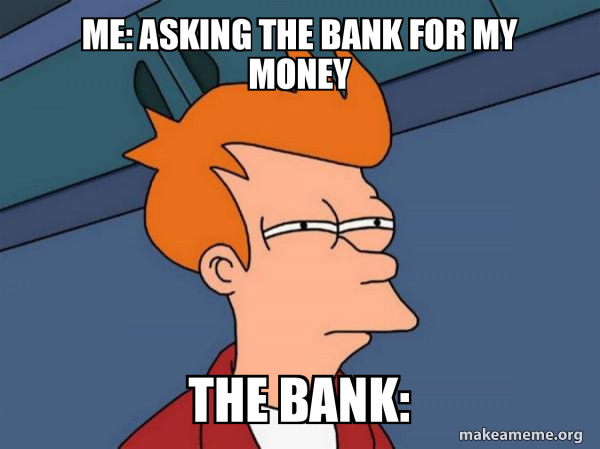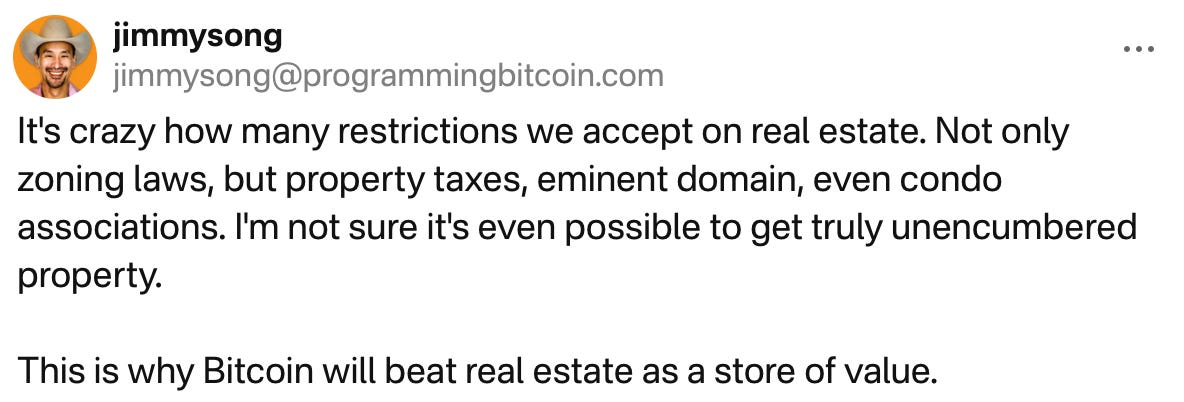Bitcoin Tech Talk #420
Interesting Stuff
Everyone's a Bank - The article is about different businesses and how they seem like retail businesses but are actually banks underneath. The businesses profiled include prominent ones like Starbucks, Carnival Cruise Lines and Delta Airlines. I've written about the financialization of these companies before, and have suspected that most of them don't make all that much money in their supposed market. This article shows how they play games with fiat to keep their position.
Warming Weather - The article is about a storm in the Sahara Desert which filled up a lake bed that had been dry for the last 50 years. The article tries very hard to make the event sound bad for the desert environment and blame man-made causes for it, but even still, it concedes that the greening of the desert is a good thing. As with most complex systems, there are good and bad things that come with any changes and it's for that reason I find the narrative around Climate Change very suspicious. Rent-seekers and the fiat money that funds them love unsolvable problems as it gives them perpetual funding.
Origins of Lawfare - It might be tempting to think that the targeting of Trump is a new phenomenon in the US. As this article shows creative prosecutorial interpretation started years ago with Giuliani in targeting Michael Milken, the so called junk bond king. The process that he helped pioneer was what was used against him politically in Georgia. This is why centralizing power in a small group can be so harmful. The legal tools, once introduced don’t ever go away and will be used by your opponents. Such is the result of power grabs in a democracy.
Cost of Being Wrong - The article is about how there are few high cost signals. gone are the days when being wrong meant ruin. These days you can be an academic that publishes wrong results and it won't be caught. The lack of consequences means more bad behavior and frankly, a lack of meaningful progress. The lack of accountability is a property of fiat systems where safety now is prioritized over long term building.
What I'm up to
Supporting Palestinian Christians - If you're wanting to support the Palestinian Christians in the West Bank, here is your chance. These are descendants of some of the first followers of Christ that still live in Bethlehem and they make nativity sets (pictured above) and jewelry made from the olive wood that grows in the area. Unfortunately, they're not exactly tech savvy and you need to contact them personally, but reply to me if you'd like to purchase them. Also, thanks to my friend Fadi, I've convinced them to take Bitcoin.
Stephan Livera - I talked to Stephan at the Plan B Forum about the Ossification debate. It’s also updates from everyone else and you can get a pretty decent idea of what the conference was like from the video. They will be releasing the videos in the next couple weeks, I think, so stay tuned.
Culinary Class Wars - This is a cooking reality show I enjoyed watching, mostly because the skill of the chefs doing the cooking was so obvious. It’s a series produced in Korea and is available on Netflix and I was especially touched by Edward Lee, a Korean-American like me. It’s a funny thing for me to be watching given that I wouldn’t eat most of the things that these chefs produced, but excellence is always entertaining to watch.
Nostr Note of the Week
What I’m Promoting
Unchained Capital is a sponsor of this newsletter. I am an advisor and proud to be a part of a company that’s enhancing security for Bitcoin holders. If you need multisig, collaborative custody or bitcoin native financial services, learn more here.
Bitcoin
Smartphone Wallet Design - The BitKey blog has a post on using FROST to make smartphone multisig bitcoin custody a lot more secure. The main property of FROST that they seem to be using is that the private key doesn’t have to change if one of the component keys gets lost or compromised. The main benefit there is that the funds don’t move on-chain in those scenarios. This is one of the more interesting new types of wallets that have come out in some time, and I look forward to seeing the technical details.
Schnorr Signature Explained - This is a site with a lot of different tutorials, but this particular one is Schnorr Signatures taught through code. It’s a really nice way to learn how they work, especially given their significance for MuSig2, FROST and other signature schemes to come. I’ve found that a lot of devs get a little nervous around cryptography in general and ECC math in particular, so doing exercises like this will help in getting used to working with these. If you want to understand the first story under Lightning about ZKPs, this is a must.
Discrete Log Equality Proofs - This is a way you can prove that the shared key generated from a ECDH (Elliptic Curve Diffie-Hellmann) key exchange is the same one as the private key used to generate a particular public key. There are two use cases, one involving private payments, and a second involving proof that you own one of a group of UTXOs. Both are very useful and in the case of the former, allows the participants in the private payment to not get DoS’d by a malicious participant.
Lightning
Wrapping Zero-Knowledge Proofs - This is not a use of Lightning Invoices I had thought of. The main mechanism is a zero-knowledge proof around a SHA256 hash which allows you to sell the solution, *trustlessly* to the counterparty. The counterparty can get the verification that the solution is the preimage of the hash and when the payment is claimed, the preimage has to be revealed as part of that claiming in a hash-timelocked-contract (HTLC). I’m not sure what the use-case for something like this might be, especially given that the proofs take many minutes on modern CPUs to run, but the fact that we can do this is pretty cool.
Athenut - This is a search engine where you can pay per search with Lightning. It’s pennies per search, but the main idea is that the incentives are aligned. They want you to get good results so you come back and don’t bombard you with ads. I really wish more of the web would move to this model as they tend to be a lot more deferential to customers, as opposed to Google who will cancel you if they don’t like what you’re doing.
Off-chain Payment Resolution - There are certain cases when routing Lightning payments that are incentive incompatible. That is, one player, if acting economically rationally will not update a channel state under a given set of circumstances. This is a protocol to mitigate the scenario using another payment which burns funds inaccessible for 20 years. It’s a radical idea, and perhaps one that is worth implementing if we see this sort of sociopathic node behavior.
Economics, Engineering, Etc.
$42 Billion MSTR Raise - As if their $16B worth of BTC wasn’t enough, they’re now raising an additional $42B. This is split $21B in new equity and $21B in fixed income assets, which I presume mostly to be bonds. The full amount is expected to be raised in the next 3 years “from time to time” and will likely be used to fund Bitcoin purchases. What’s more, they’ve rebranded themselves as a Bitcoin treasury company rather than as a software company. Have they figured out a cheat code to fiat money that others will copy? We shall see over the next 3 years.
Nocoiner Syndrome - The Institute of CryptoAnarchy has published a paper on the nocoiner phenomenon, specifically those people that label Bitcoin as something immoral. It’s a bit of a tongue-in-cheek document, parallelling the ECB paper on Bitcoin a couple of weeks ago, and mostly talks about the incentives that lead to NoCoiner-ism, and conversely, how to cure this malady using a bit of Bitcoin ownership.
Hardware Multisig Performance - Jameson Lopp has published how long hardware devices take to sign large transactions and there are some obvious ones to be on the lookout for. Ledger seems to do very poorly with HWI as implemented in Bitcoin Core, though it does fine with Electrum. Foundation Passport seems to have limited memory and just fails on certain large transactions. There are also various other complaints which I’ve experienced myself, the QR scanners on some of these devices don’t work all that well. Worth reading if you’re setting up multisig.
Quick Hits
Dept. of Government Efficiency - Elon’s job with a potential Trump administration, as was pointed out here, has the acronym DOGE.
$3M Recovered - A guy locked himself out of his Bitcoin, but luckily, the password generator was insecure. 🤦
BitKey in Time - The magazine names the hardware wallet one of the 200 best inventions of 2024
Emory SEC Filing - The University in Atlanta, Georgia holds some Bitcoin ETFs.
Fiat delenda est.








